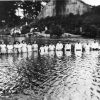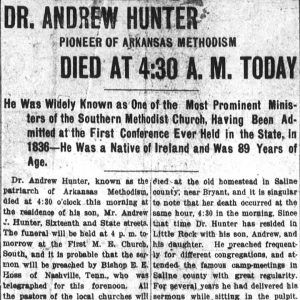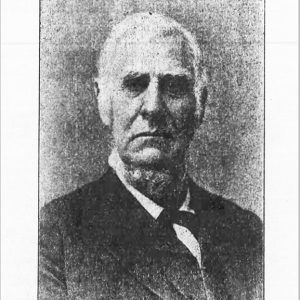calsfoundation@cals.org
Andrew Hunter (1813–1902)
Andrew Hunter, one of the earliest and longest-surviving itinerant preachers in Arkansas, was an influential, popular, and highly respected leader in the development of Methodism in Arkansas. He served in almost every capacity in the Methodist organization and was involved in most of the historic events in the Methodist Church during his fifty-five years of active ministry and subsequent services after retirement in 1889.
Andrew Hunter was born on December 26, 1813, in Ballymoney County, Antrim, Ireland. His mother converted from Catholicism to Presbyterianism before the family migrated to Pennsylvania, while he was still very young. The attentive ministrations of a Methodist preacher during the illness and subsequent death of Andrew’s father led to the family’s conversion to Methodism. Hunter converted on January 31, 1833.
After attending college briefly in Missouri, he began teaching at a small school southwest of St. Louis, Missouri. In 1835, moved by an appeal for teachers at an Indian mission, he enlisted and was assigned to “Hitchity Town” school in Indian Territory (present-day Oklahoma). Traveling the territory on horseback with a few provisions, including a bed tick filled with finely chopped hay, he began teaching and—before he was officially licensed—preaching. He was admitted to the ministry on a trial basis at Batesville (Independence County) in November 1836 during the first conference of the Methodist Church in Arkansas.
Hunter was very quickly recognized as an able and dedicated leader. He had a mellow, vibrant voice and was earnest, dignified, unselfish, and unpretentious. He exerted leadership in the dramatic growth of the Church between 1840 and 1850 and in historic events, including the 1844 General Conference in New York City during which the slavery controversy divided the Methodist Church into North and South jurisdictions, as well as the first General Conference of the Methodist Episcopal Church, South following the split. He was also an important leader during the state’s period of Reconstruction after the Civil War. His ministries covered most parts of the state from north to south and east to west, and included small circuits as well as larger thriving communities. He was influential in the establishment of many of the schools started by the Methodist Church around the state, including the Arkansas Female College.
During his ministry, Hunter served as delegate to twelve General Conferences, served on an Ecumenical Conference in 1891, and, in the absence of a bishop, presided five times as president at district conferences. He was granted an honorary Doctorate of Divinity degree from a small, short-lived college. Following the Civil War, he was elected to the state Senate from Bradley and Dallas counties and served as president of the Senate. He was elected later to the U.S. Senate, though his term was voided in the Reconstruction of state government. During the Brooks-Baxter War, he was urged to run for governor but declined. Hunter Memorial Chapel in Little Rock (Pulaski County) and Hunter Chapel, built in 1880 in Bryant (Saline County), were named for him.
On October 24, 1844, Hunter married Anna M. Jones in Little York, Pennsylvania. She became an active partner in his ministry. They had two sons and a daughter.
Many letters Hunter wrote to the Arkansas Methodist following his retirement, as well as his Recollections, offer his astute, insightful comments, and graphic characterizations of other ministers and events with which he was associated.
When Hunter died on July 3, 1902, at the home of his son in Little Rock, he was the last of the charter members of Arkansas’s first Methodist conference. He and his wife are both buried in Oakland Memorial Cemetery in Little Rock.
For additional information:
Anderson, James A. A Centennial History of Arkansas Methodism. Benton, AR: L. B. White Printing Co., 1935.
Britton, Nancy. Two Centuries of Methodism in Arkansas. Little Rock: August House, 2000.
“Dr. Andrew Hunter, Pioneer of Arkansas Methodism, Died at 4:30 A.M. Today.” Arkansas Democrat. June 3, 1902, pp. 1, 8.
Jewell, Horace. History of Methodism in Arkansas. Little Rock: Press Printing Co., 1892.
Williams, Mrs. F. M. “Andrew Hunter, Pioneer Methodist (1813–1902).” Arkansas Historical Quarterly 4 (Autumn 1945): 234–240.
Katherine Stanick
Little Rock, Arkansas








Also named for Andrew Hunter is Hunter’s Chapel near Casscoe in Arkansas County, Arkansas. It is listed as a historical site by the Arkansas State Society, National Colonial Dames XVII Century. The chapel is still in use and has a cemetery holding about 350 graves.